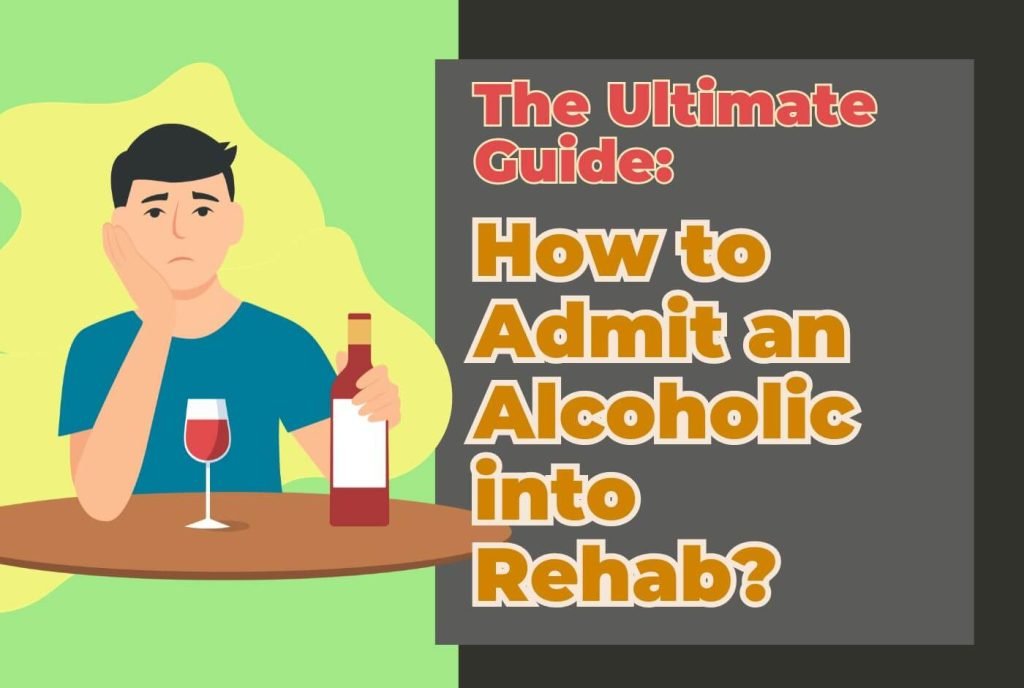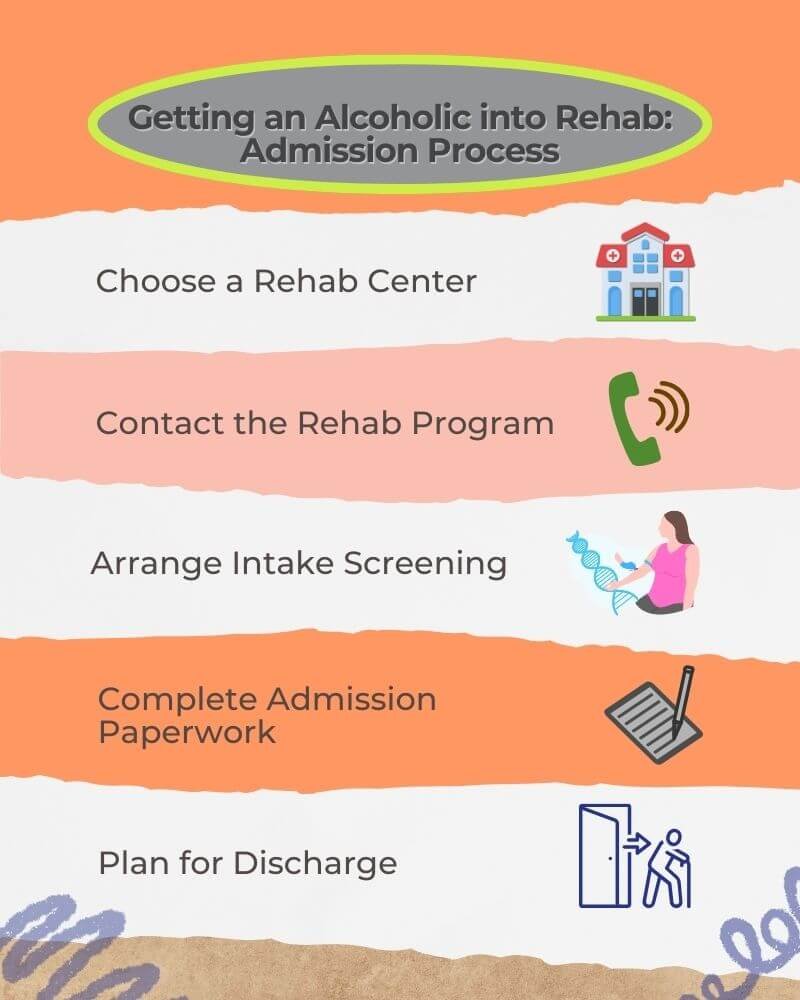According to the National Institute on Alcohol Abuse and Alcoholism (NIAAA), about one-third of people who are treated for alcohol problems have no further symptoms, along with reducing drinking one year later.
So, if you find someone alcoholic, you should not delay admitting him or her into rehab. In the long run, this can help not only the affected one but an entire family as well as society.

However, the sad fact is admitting someone to rehab is not that easy. And I know this because when my best friend was an alcoholic, I went through a lot with him. So, in this guide, I’ll share every possible way and tips to help an alcoholic about getting into rehab. This includes understanding the different treatment options available, how to approach the topic with your loved one, and the importance of supporting their decision. It’s also crucial to find a rehab center that specializes in rehabilitating alcoholics with mental health issues, as this can greatly impact their journey to recovery. With the right knowledge and resources, you can help your loved one take the necessary steps towards a healthier, sober life.
Can You Force an Alcoholic into Rehab
No, you can’t force any alcoholic into rehab, no matter if they are your close one. Well, if the addicted person is not an adult yet, meaning under the age of 18, as a legal guardian, you can force. However, in the case of the adult one, over 18 years, you can’t force.
So, if you belong to one of the states where forcing someone into rehab is illegal, you should stop and look for other legal options.
In this case, if the person you think needs immediate treatment for alcohol consumption, you have no other options than taking the help of law, such as Involuntary Commitment Laws, Drug Court Orders, Substance Use Emergency Commitment, etc.
These legal procedures help when the person does not wish to take treatment but is badly in need of it.
Getting an Alcoholic into Rehab: Before Admission
I know how me and my friends struggled to convince my friend to get rehab treatment when my best friend was alcohol addicted. Though the addict does not consent to this or does not feel the gradual, dangerous impact on him, it is necessary to start the treatment for his well-being quickly.
And so, I will now share some tips along with my researched guidance here for you.
Know the Reason for Unwillingness
Well, before the admission process, it’s necessary to make the person convinced for it either willingly or legally. If it’s impossible to convince, at first, you should try to inspect why he or she does not want treatment. Is it fear, embarrassment, or any other reason?
Ensure the person struggling with alcohol addiction knows they have a support network. Offer empathy, encouragement, and assistance and show the safe side and secure treatment options of different rehab centers.
Get Professional Guidance & Law Support
Consider staging an intervention to make him understand the family’s support and care. For this, I personally prefer gathering close friends and cousins, as I have done the same to assist my friend.
However, arranging a virtual appointment with a medical professional who can guide the further steps and treatment options to assess the condition can be beneficial.
steps and treatment options to assess the condition can be beneficial.
| States Allowing Involuntary Commitment Program | |
| Texas | California |
| Minnesota | Washington |
| Iowa | Alaska |
| Missouri | Hawaii |
| Delaware | Montana |
| Louisiana | North & South Dakota |
| Arkansas | Oklahoma |
| Mississippi | Colorado |
| Michigan | Nebraska |
| Wisconsin | Kansas |
| Indiana | District of Columbia |
| Kentucky | Connecticut |
| Tennessee | Vermont |
| Ohio | Maine |
| West Virginia | Massachusetts |
| Pennsylvania | Rhode Island |
| Virginia | District of Columbia |
| North & South Carolina | Connecticut |
| Florida | Vermont |
| Georgia | |
Check for Insurance Coverage
Contact the individual’s health insurance provider to find out if they have any coverage for addiction treatment. Many insurance plans offer coverage for rehab services, making them more accessible and affordable.
Take the Help of a Private Therapist
Suppose your loved one is reluctant to seek rehab. In that case, you can start therapy with a licensed counselor or a private therapist who specializes in addiction. A therapist can help build motivation for the treatment and provide valuable insights.
Take Help from an Online Support System
Before heading for any bold steps, I suggest checking online support. Reach out to emergency helplines and hotlines like the Substance Abuse and Mental Health Services Administration (SAMHSA) National Helpline (1-800-662-HELP) for further guidance and credential support.
Before admitting someone to rehab, proving whether the person needs rehab treatment is essential. If yes, then whether it needs inpatient treatment or outpatient treatment.
Besides, different non-government organizations, religious institutions, and local support groups that may have information and connections to rehab centers or programs can be helpful at this time.
Getting an Alcoholic into Rehab: Admission Process
Are you ready to admit your loved one into rehab for their betterment? Then follow the steps below for the rehab admissions process –

Choose a Rehab Center
Consider some research and recommendations for choosing a rehab program. Check for the local rehab centers to see which one is convenient and environment-friendly for the person.
Contact the Rehab Program
After choosing the right rehab center, it is now time to choose the rehab program. At first, some physical and mental health evaluation, an addiction history, and some other inspection will be done for the admission to determine which treatment is necessary for the individual.
Arrange Intake Screening
Before admitting the addicted person, a pre-admission screening is done—nothing to worry about here. I have seen coordinators taking an initial step to check the fitment, asking some basic questions, and finding the best suitable treatment options available for the addicted person.
A method called the Alcohol Use Disorders Identification Test (AUDIT) is used in this screening program. This can be done over a phone call or video call too. And I know most rehab centers, like American Addiction Center, Rehab Clinic Group offer this intake screening free of cost.
Complete Admission Paperwork
After agreeing to their treatment option, you need to fill out the admission form and provide other details to start the procedure.
For example, if the addicted person has insurance coverage, you need to submit the insurance paper. Plus, the payment procedure for the treatment needs to be done in this step to complete the admission intake process.
Plan for Discharge
Finally, you can plan for the discharge. Yes, after completing the intake and initial screening, specialized professionals can plan the treatment completion time and discharge timetable depending on the person’s condition.
However, adjustments may be made as necessary. Throughout the rehab program, the individual’s progress is continually assessed to ensure an effective treatment plan.
Besides, the admission process can vary slightly depending on the rehab clinics. I have mentioned the ways that I have seen while consulting for my friend’s treatment. But the basic steps should be the same.
FAQ
Can You Force a Family Member Into Rehab?
Yes, only one member is under 18 years old. As a family member, you have the right but can’t do so if the member is over 18 years old. Most states consider it illegal to force an adult getting into rehab.
Can you admit an alcoholic into rehab against his/her will?
Yes, as long as you can get the involuntary commitment law to legally admit it. This commitment will help determine the individual’s addiction state as well as their legal rights for admission. However, forced drug rehab in most cases does not seem to work in the long run.
Can parents force alcoholic children to get into rehab?
Yes, as legal guardians, parents can force alcoholic children to get into rehab. If children refuse to seek treatment, a legal guardian can force them to alcohol refusing treatment for the children’s well-being.
Can you force your alcoholic partner to get into rehab?
No, you can’t. In this case, you need to take the help of the law to get your partner admitted to rehab. Apart from this, you can go for open discussion, seek other support, and set boundaries for yourself.
- What to Pack for 30-Day Rehab? FREE Checklist - May 30, 2024
- Types of Outpatient Rehab: Difference One Should Know - March 28, 2024
- Truth Behind FMLA: Hidden Hurdles of Alcohol Rehab Leave - March 28, 2024